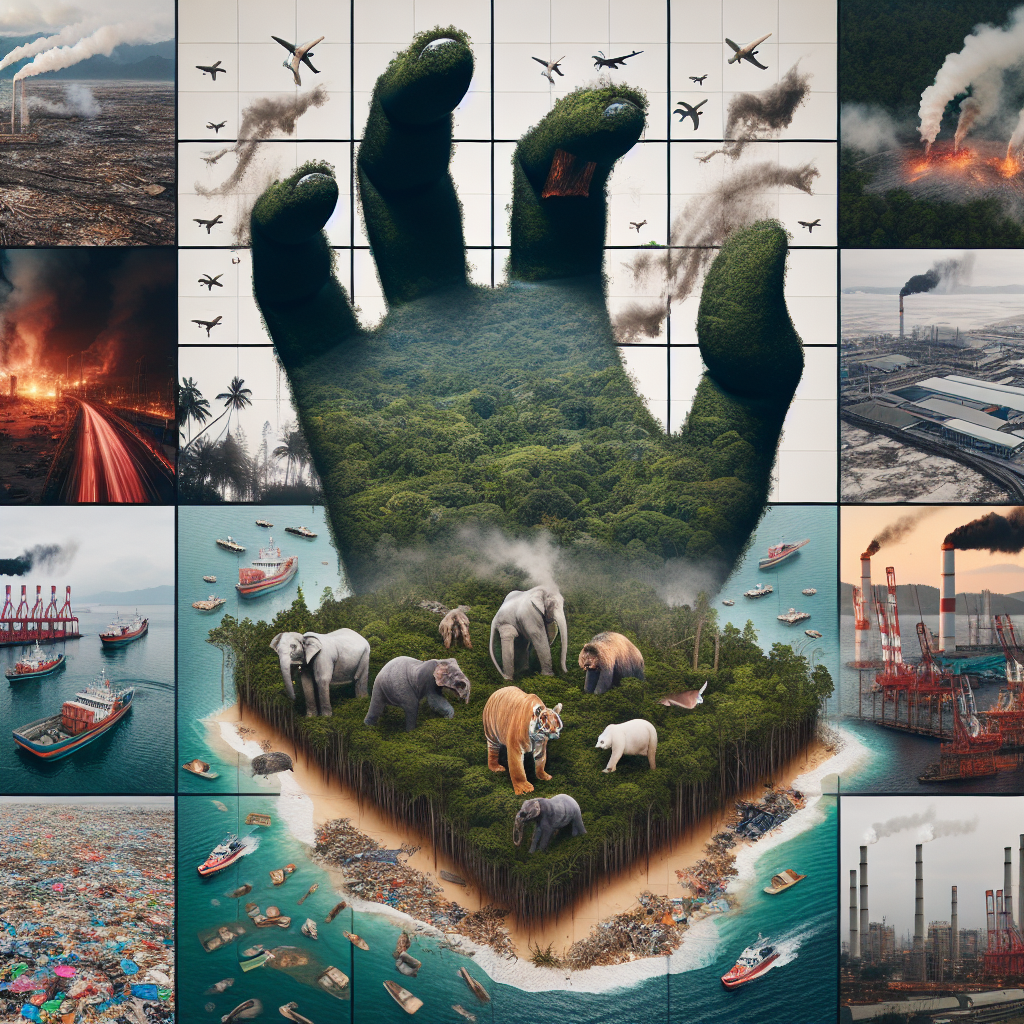Isu Lingkungan Hidup yang Menghantui Indonesia: Deforestasi, polusi udara, limbah plastik, perubahan iklim, kebakaran hutan, dan kerusakan ekosistem laut.
Isu Lingkungan Hidup yang Menghantui Indonesia
-
Table of Contents
- Introduction
- Deforestation and Illegal Logging
- The Scale of Deforestation
- The Impact on Biodiversity
- Contributing Factors
- Potential Solutions
- Air and Water Pollution
- Air Pollution
- Water Pollution
- Addressing Air and Water Pollution
- Climate Change and Natural Disasters
- Climate Change Impacts
- Natural Disasters
- Adapting to Climate Change
- Conclusion
Introduction

Indonesia, with its vast natural resources and diverse ecosystems, is facing numerous environmental challenges. From deforestation and illegal logging to air and water pollution, the country is grappling with a range of issues that are not only threatening its unique biodiversity but also the health and well-being of its people. This article aims to shed light on some of the most pressing environmental issues haunting Indonesia and explore potential solutions to address them.
Deforestation and Illegal Logging
The Scale of Deforestation
Indonesia has one of the highest deforestation rates in the world. According to data from the Ministry of Environment and Forestry, the country lost an average of 1.08 million hectares of forest per year between 2000 and 2012. This rampant deforestation is primarily driven by the expansion of palm oil plantations, logging for timber, and the conversion of forests for agriculture.
The Impact on Biodiversity
The loss of forests in Indonesia has severe consequences for its rich biodiversity. The country is home to iconic species such as orangutans, tigers, and elephants, which are now critically endangered due to habitat destruction. Deforestation also disrupts the delicate balance of ecosystems, leading to the extinction of numerous plant and animal species.
Contributing Factors
Illegal logging plays a significant role in exacerbating deforestation in Indonesia. Weak law enforcement, corruption, and the lack of sustainable forest management practices have allowed illegal loggers to operate with impunity. The demand for timber, both domestically and internationally, further fuels this destructive practice.
Potential Solutions
To tackle deforestation and illegal logging, Indonesia needs to strengthen its law enforcement and improve forest governance. Implementing stricter regulations, increasing penalties for illegal logging, and promoting sustainable forest management practices are crucial steps towards preserving the country’s forests. Additionally, promoting alternative livelihoods for communities dependent on logging and raising awareness about the importance of forests can help reduce the demand for illegal timber.
Air and Water Pollution
Air Pollution
Indonesia’s rapid industrialization and urbanization have led to alarming levels of air pollution, particularly in major cities like Jakarta. The burning of fossil fuels, vehicle emissions, and industrial activities contribute to the release of harmful pollutants such as particulate matter, sulfur dioxide, and nitrogen oxides. These pollutants not only pose a significant risk to human health but also contribute to climate change.
Water Pollution
Water pollution is another pressing environmental issue in Indonesia. Industrial waste, agricultural runoff, and inadequate wastewater treatment systems contaminate rivers, lakes, and coastal areas. This pollution not only affects aquatic ecosystems but also poses a threat to public health, as many communities rely on contaminated water sources for drinking and daily activities.
Addressing Air and Water Pollution
To combat air pollution, Indonesia needs to prioritize the transition to cleaner energy sources and promote sustainable transportation options. Investing in renewable energy, improving public transportation infrastructure, and implementing stricter emission standards for industries can significantly reduce air pollution levels.
Similarly, addressing water pollution requires better wastewater management systems, stricter regulations on industrial waste disposal, and promoting sustainable agricultural practices. Educating communities about the importance of clean water sources and providing access to safe drinking water are also crucial steps towards mitigating water pollution.
Climate Change and Natural Disasters
Climate Change Impacts
Indonesia is highly vulnerable to the impacts of climate change. Rising sea levels, increased frequency and intensity of extreme weather events, and changing rainfall patterns pose significant challenges to the country’s coastal areas, agriculture, and water resources. These changes not only threaten the livelihoods of millions of Indonesians but also exacerbate existing environmental issues.
Natural Disasters
Indonesia is located in the Pacific Ring of Fire, making it prone to earthquakes, volcanic eruptions, and tsunamis. Climate change further increases the risk of natural disasters, as rising temperatures can trigger more frequent and intense extreme weather events. The devastating impacts of events like the 2004 Indian Ocean tsunami and the 2018 Palu earthquake highlight the urgent need for effective disaster preparedness and mitigation strategies.
Adapting to Climate Change
To adapt to the impacts of climate change, Indonesia needs to prioritize climate resilience in its policies and planning. This includes investing in early warning systems, improving infrastructure to withstand natural disasters, and promoting sustainable agriculture practices that are resilient to changing weather patterns. Additionally, international cooperation and financial support are crucial to help Indonesia build its climate resilience capacity.
Conclusion
Indonesia is facing a multitude of environmental challenges that require urgent attention and action. From deforestation and illegal logging to air and water pollution, as well as the impacts of climate change and natural disasters, the country’s environmental issues are interconnected and complex. However, by strengthening law enforcement, promoting sustainable practices, and prioritizing climate resilience, Indonesia can pave the way towards a more sustainable and environmentally conscious future. It is crucial for the government, civil society, and international partners to work together to address these challenges and protect Indonesia’s unique natural heritage for future generations.






